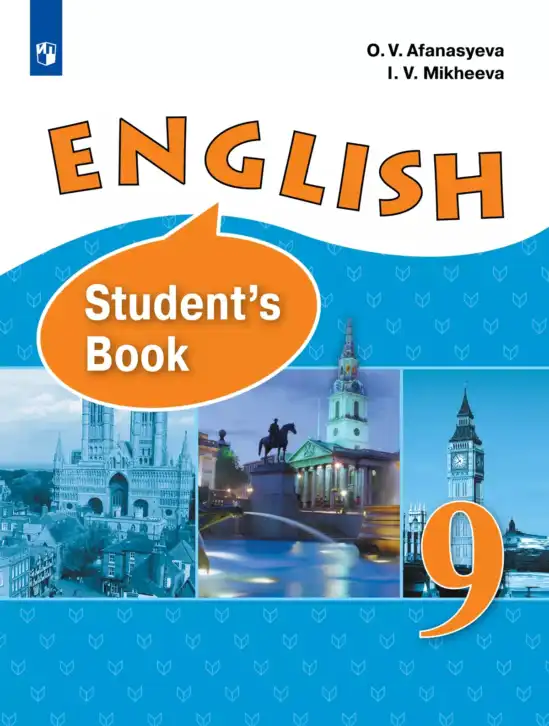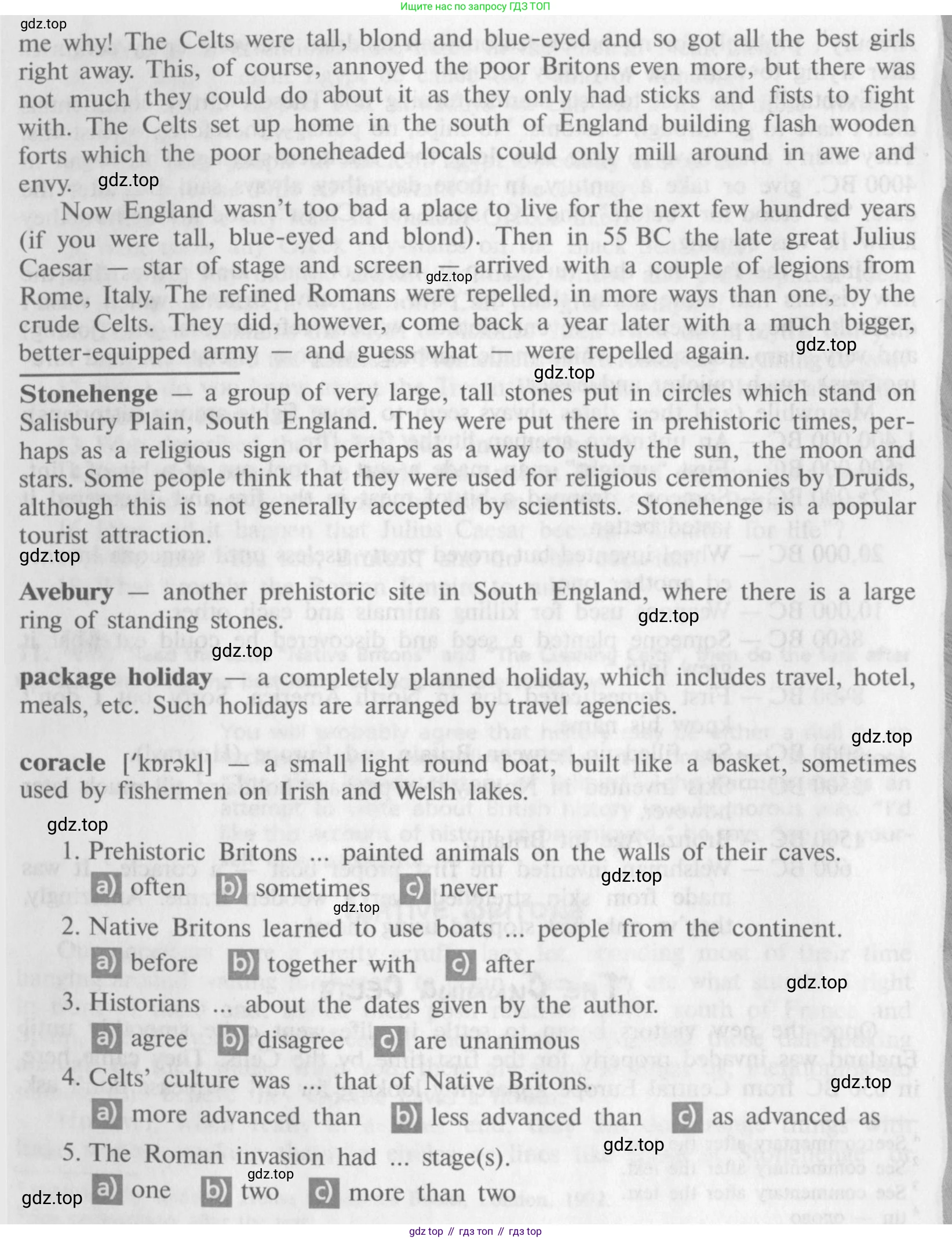Номер 11, страница 14 - гдз по английскому языку 9 класс учебник Афанасьева, Михеева

Авторы: Афанасьева О. В., Михеева И. В.
Тип: Student's book (Учебник)
Издательство: Просвещение
Год издания: 2014 - 2025
Уровень обучения: углублённый
Цвет обложки: голубой, белый
ISBN: 978-5-09-034231-5
Рекомендовано Министерством образования и науки Российской Федерации
Популярные ГДЗ в 9 классе
Unit 1. Pages of history: linking past and present. Reading - номер 11, страница 14.
№11 (с. 14)
Условие. №11 (с. 14)
скриншот условия



11. SFA Read the texts "Native Britons" and "The Cunning Celts", then do the task after the texts choosing the best items to complete the sentences.
You will probably agree that history may be either a dull or an exciting subject depending on how it is presented. In his book "The Very Bloody History of Britain"1 John Farman makes an attempt to write about British history in a humorous way. "I'd like history to be enjoyed," he says. See for yourself how successful he is.
NATIVE BRITONS
Our ancestors were a pretty scruffy, lazy lot, spending most of their time hanging around waiting for history to begin. They only ate what stumbled right in front of them and, unlike their posh relatives in the south of France and Spain, didn't even try to cheer up their caves by painting those daft-looking animals on their walls. Mind you, there are some amongst us, mentioning no names, who believe they did do the caves a
favour!
However, when really at a loose end, they did do strange things with huge stones; stacking them in circles or lines like those at Stonehenge2 or
Avebury1, probably for no better reason than to drive everyone crazy centuries later trying to work out why they did it.
Eventually, the first tourists started turning up. These swarthy continentals didn't have to go through Customs. No ships, no ports — therefore no Customs. They didn't even have to state how long they intended staying. This began in 4000 BC, give or take a century. In those days they always said BC after the date. "B" stood for "before" and "C" stood for "Christ". God knows how they knew he was coming.
Simply the fact that they turned up in boats of some kind proves that the new visitors had more brains than the poor old native Britons, which wasn't difficult. They proceeded to invent clothes, wheels, refrigerators (only joking) and very sharp iron spears which made stabbing our poor forefathers (and foremothers) much quicker and easier.
Meanwhile (and these dates always seem to cause fights among historians):
1,400,000 BC — An unknown apeman lit the first fire.
500,000 BC — First "upright" man made a sort of tool out of a bit of flint.
25,000 BC — Someone dropped a bit of meat in the fire and discovered it tasted better.
20,000 BC — Wheel invented but proved pretty useless until someone invented another one.
10,000 BC — Weapons used for killing animals and each other.
8600 BC — Someone planted a seed and discovered he could eat what it grew into.
8400 BC — First domesticated dog in North America. Sorry, but I don't know his name.
5000 BC — Sea filled up between Britain and Europe (Hooray!).
2500 BC — Skis invented in Norway. No package holidays2 till much later however.
1500 BC — Bronze Age hit Britain.
600 BC — Welshman invented the first proper boat — a coracle.3 It was made from skin stretched over a wooden frame. Amazingly, they've only just stopped using them!
THE CUNNING CELTS
Once the new visitors began to settle in, life went quite smoothly until England was invaded properly for the first time by the Celts. They came here in 650 BC from Central Europe apparently looking for tin4 — please don't ask me why! The Celts were tall, blond and blue-eyed and so got all the best girls right away. This, of course, annoyed the poor Britons even more, but there was not much they could do about it as they only had sticks and fists to fight with. The Celts set up home in the south of England building flash wooden forts which the poor boneheaded locals could only mill around in awe and envy.
Now England wasn't too bad a place to live for the next few hundred years (if you were tall, blue-eyed and blond). Then in 55 BC the late great Julius Caesar — star of stage and screen — arrived with a couple of legions from Rome, Italy. The refined Romans were repelled, in more ways than one, by the crude Celts. They did, however, come back a year later with a much bigger, better-equipped army — and guess what — were repelled again.
Stonehenge — a group of very large, tall stones put in circles which stand on Salisbury Plain, South England. They were put there in prehistoric times, perhaps as a religious sign or perhaps as a way to study the sun, the moon and stars. Some people think that they were used for religious ceremonies by Druids, although this is not generally accepted by scientists. Stonehenge is a popular tourist attraction.
Avebury — another prehistoric site in South England, where there is a large ring of standing stones.
package holiday — a completely planned holiday which includes travel, hotel, meals, etc. Such holidays are arranged by travel agencies.
coracle ['kɒrəkl] — a small light round boat, built like a basket, sometimes used by fishermen on Irish and Welsh lakes.
1. Prehistoric Britons ... painted animals on the walls of their caves.
a) often b) sometimes c) never
2. Native Britons learned to use boats ... people from the continent.
a) before b) together with c) after
3. Historians ... about the dates given by the author.
a) agree b) disagree c) are unanimous
4. Celts' culture was ... that of Native Britons.
a) more advanced than b) less advanced than c) as advanced as
5. The Roman invasion had ... stage(s).
a) one b) two c) more than two
Решение. №11 (с. 14)

Решение 2. №11 (с. 14)
Ответ:
1. c) never (никогда)
2. c) after (после)
3. b) disagree (не согласны)
4. a) more advanced than (более развитой, чем)
5. b) two (два)
Другие задания:
Помогло решение? Оставьте отзыв в комментариях ниже.
Присоединяйтесь к Телеграм-группе @top_gdz
ПрисоединитьсяМы подготовили для вас ответ c подробным объяснением домашего задания по английскому языку за 9 класс, для упражнения номер 11 расположенного на странице 14 к Учебник (Student's book) 2014 года издания для учащихся школ и гимназий.
Теперь на нашем сайте ГДЗ.ТОП вы всегда легко и бесплатно найдёте условие с правильным ответом на вопрос «Как решить ДЗ» и «Как сделать» задание по английскому языку к упражнению №11 (с. 14), авторов: Афанасьева (Ольга Васильевна), Михеева (Ирина Владимировна), ФГОС (старый) углублённый уровень обучения учебного пособия издательства Просвещение.














